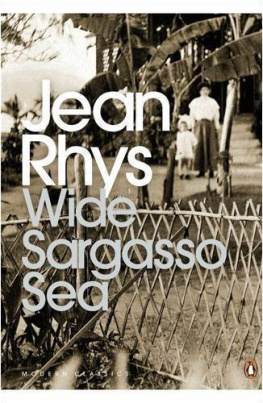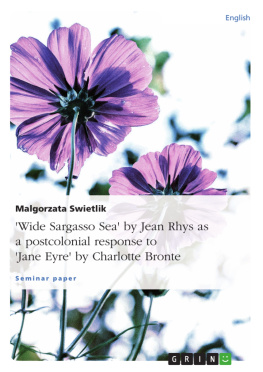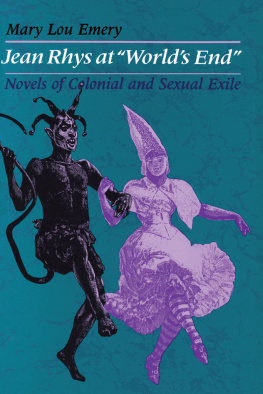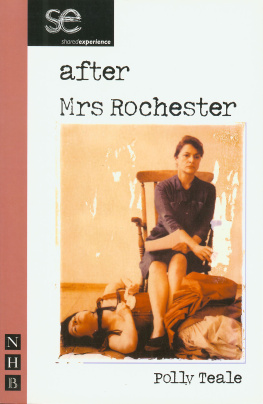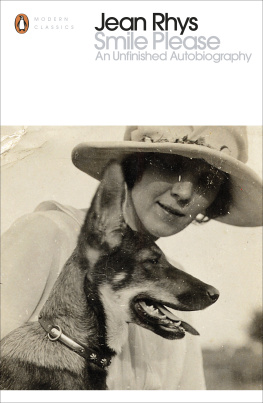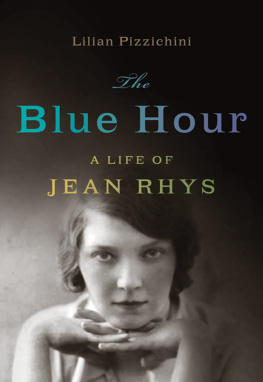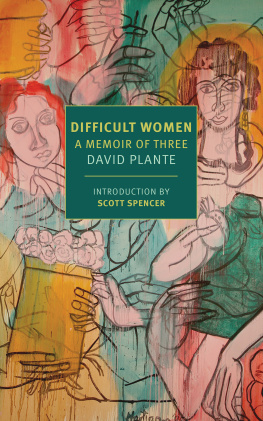WIDESARGASSO SEA
By
Jean Rhys
First published in 1966
Part One
They say when trouble come close ranks, and so the white people did.But we were not in their ranks. The Jamaican ladies had never approved of mymother, because she pretty like pretty self Christophine said.
She was my fathers second wife, far too young for him they thought,and, worse still, a Martinique girl. When I asked her why so few people came tosee us, she told me that the road from Spanish Town to Coulibri Estate where welived was very bad and that road repairing was now a thing of the past. (Myfather, visitors, horses, feeling safe in bed all belonged to the past.)
Another day I heard her talking to Mr Luttrell, our neighbour andher only friend. Of course they have their own misfortunes. Still waiting forthis compensation the English promised when the Emancipation Act was passed.Some will wait for a long time.
How could she know that Mr Luttrell would be the first who grewtired of waiting? One calm evening he shot his dog, swam out to sea and wasgone for always. No agent came from England to look after his property Nelsons Rest it was called and strangers from Spanish Town rode up to gossipand discuss the tragedy.
Live at Nelsons Rest? Not for love or money. An unlucky place.
Mr Luttrells ho was left empty, shutters banging in the wind. Soonthe black people said it was haunted, they wouldnt go near it. And no one camenear us.
I got used to a solitary life, but my mother still planned and hoped perhaps she had to hope every time she passed a looking glass.
She still rode about every morning not caring that the black peoplestood about in groups to jeer at her, especially after her riding clothes grewshabby (they notice clothes, they know about money).
Then, one day, very early I saw her horse lying down under thefrangipani tree. I went up to him but he was not sick, he was dead and his eyeswere black with flies. I ran away and did not speak of it for I thought if Itold no one it might not be true. But later that day, Godfrey found him, he hadbeen poisoned. Now we are marooned, my mother said, now what will become ofus?
Godfrey said, I cant watch the horse night and day. I too old now.When the old time go, let it go. No use to grab at it. The Lord make nodistinction between black and white, black and white the same for Him. Restyourself in peace for the righteous are not forsaken. But she couldnt. Shewas young. How could she not try for all the things that had gone so suddenly,so without warning. Youre blind when you want to be blind, she saidferociously, and youre deaf when you want to be deaf. The old hypocrite, shekept saying. He knew what they were going to do. The devil prince of thisworld, Godfrey said, but this world dont last so long for mortal man.
She persuaded a Spanish Town doctor to visit my younger brotherPierre who staggered when he walked and couldnt speak distinctly. I dont knowwhat the doctor told her or what she said to him but he never came again andafter that she changed. Suddenly, not gradually. She grew thin and silent, andat last she refused to leave the house at all.
Our garden was large and beautiful as that garden in the Bible thetree of life grew there. But it had gone wild. The paths were overgrown and asmell of dead flowers mixed with the fresh living smell. Underneath the treeferns, tall as forest tree ferns, the light was green. Orchids flourished outof reach or for some reason not to be touched. One was snaky looking, another likean octopus with long thin brown tentacles bare of leaves hanging from a twistedroot. Twice at year the octopus orchid flowered then not an inch of tentacleshowed. It was a bell-shaped mass of white, mauve, deep purples, wonderful tosee. The scent was very sweet and strong. I never went near it.
All Coulibri Estate had gone wild like the garden, gone to bush. Nomore slavery why should anybody work? This never saddened me. I didnot remember the place when it was prosperous.
My mother usually walked up and down the glacis, a pavedroofed-in terrace which ran the length of the house and sloped upward to aclump of bamboos. Standing by the bamboos she had a clear view to the sea, butanyone passing could stare at her. They stared, sometimes they laughed. Longafter the sound was far away and faint she kept her eyes shut and her handsclenched. A frown came between her black eyebrows, deep it might have beencut with a knife. I hated this frown and once I touched her forehead trying tosmooth it. But she pushed me away, not roughly but calmly, coldly, without aword, as if she had decided once and for all that I was useless to her. Shewanted to sit with Pierre or walk where she pleased without being pestered, shewanted peace and quiet. I was old enough to look after myself. Oh, let mealone, she would say, let me alone, and after I knew that she talked aloudto herself I was a little afraid of her.
So I spent most of my time in the kitchen which was an outbuildingsome way off. Christophine slept in the little room next to it.
When evening came she sang to me if she was in the mood. I couldntalways understand her patois songs she also came from Martinique but shetaught me the one that meant The little one grow old, the children leave us, willthey come back? and the one about the cedar tree flowers which only last for aday.
The music was gay but the words were sad and her voice oftenquavered and broke on the high note. Adieu. Not adieu as we said it, but dieu, which made more sense after all. The loving man was lonely, the girlwas deserted, the children never came back. Adieu
Her songs were not like Jamaican songs, and she was not like theother women.
She was much blacker blue-black with a thin face and straightfeatures. She wore a black dress, heavy gold ear-rings and a yellowhandkerchief carefully tied with the two high points in front. No other negrowoman wore black, or tied her handkerchief Martinique fashion. She had a quietvoice and a quiet laugh when she did laugh), and though she could speak goodEnglish if she wanted to, and French as well as patois, she took care to talkas they talked. But they would have nothing to do with her and she never sawher son who worked in Spanish Town. She had only one friend a woman calledMaillotte, and Maillotte was not a Jamaican.
The girls from the bayside who sometimes helped with the washing andcleaning were terrified of her. That, I soon discovered, was why they came atall for she never paid them. Yet they brought presents of fruit andvegetables and after dark I often heard low voices from the kitchen.
So I asked about Christophine. Was she very old? Had she always beenwith us?
She was your fathers wedding present to me one of his presents.He though I would be pleased with a Martinique girl. I dont know how old shewas when they brought her to Jamaica, quite young. I dont know how old she isnow. Does it matter? Why do you pester and bother me about all these thingsthat happened long ago? Christophine stayed with me because she wanted to stay.She had her own very good reasons you may be sure. I dare say we would havedied if shed turned against us and that would have been a better fate. To dieand be forgotten and at peace. Not to know that one is abandoned, lied about,helpless. All the ones who died who says a good word for them now?
Godfrey stayed too, I said. And Sass.
They stayed, she said angrily, because they wanted somewhere tosleep and something to eat. That boy Sass! When his mother pranced off and lefthim here a great deal she cared why he was a little skeleton. Nowhes growing into a big strong boy and away he goes. We shant see him again.Godfrey is a rascal. These new ones arent too kind to old people and he knowsit. Thats why he stays. Doesnt do a thing but eat enough for a couple ofhorses. Pretends hes deaf. He isnt deaf he doesnt want to hear. What adevil he is!
Next page
